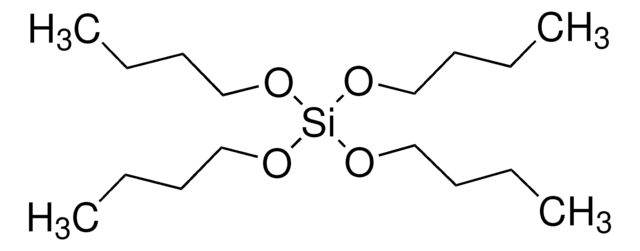131903
Tetraethyl orthosilicate
reagent grade, 98%
Synonym(s):
Orthosilicic acid tetraethyl ester, Silicon tetraethoxide, TEOS, Tetraethoxysilane, Tetraethoxysilicon(IV), Tetraethyl silicate
About This Item
Recommended Products
grade
reagent grade
Quality Level
vapor density
7.2 (vs air)
vapor pressure
<1 mmHg ( 20 °C)
Assay
98%
form
liquid
refractive index
n20/D 1.382 (lit.)
bp
168 °C (lit.)
density
0.933 g/mL at 20 °C (lit.)
SMILES string
CCO[Si](OCC)(OCC)OCC
InChI
1S/C8H20O4Si/c1-5-9-13(10-6-2,11-7-3)12-8-4/h5-8H2,1-4H3
InChI key
BOTDANWDWHJENH-UHFFFAOYSA-N
Looking for similar products? Visit Product Comparison Guide
General description
Application
- As an anti-solvent to fabricate efficient perovskite layer for inverted planar solar cells with enhanced power conversion efficiency and reproducibility. TEOS helps to achieve high-quality perovskite films with reduced density of defects, and thus slower carrier recombination.
- As a sol-gel precursor to synthesize SiO2-TiO2 anti-reflective self-cleaning coatings for solar cells.
- To fabricate nano silica functionalized crosslinked hybrid membranes for proton exchange membrane fuel cell applications. These membranes have better proton conductivity and thermal stability.
- To prepare poly(vinylidene fluoride)/TEOS matrix separator to enhance the performance of Li-ion batteries. The separator exhibits excellent electrolyte retention and wettability.
Features and Benefits
- Excellent adhesion on substrates
- Uniform film deposition
- Cross-linker to introduce polymer strands into hydrogel
Signal Word
Warning
Hazard Statements
Precautionary Statements
Hazard Classifications
Acute Tox. 4 Inhalation - Eye Irrit. 2 - Flam. Liq. 3 - STOT SE 3
Target Organs
Respiratory system
Storage Class Code
3 - Flammable liquids
WGK
WGK 1
Flash Point(F)
113.0 °F - closed cup
Flash Point(C)
45 °C - closed cup
Personal Protective Equipment
Certificates of Analysis (COA)
Search for Certificates of Analysis (COA) by entering the products Lot/Batch Number. Lot and Batch Numbers can be found on a product’s label following the words ‘Lot’ or ‘Batch’.
Already Own This Product?
Find documentation for the products that you have recently purchased in the Document Library.
Customers Also Viewed
Articles
Silica's versatility spans various industries, including biomedical applications.
Silica's versatility spans various industries, including biomedical applications.
Silica's versatility spans various industries, including biomedical applications.
Silica's versatility spans various industries, including biomedical applications.
Our team of scientists has experience in all areas of research including Life Science, Material Science, Chemical Synthesis, Chromatography, Analytical and many others.
Contact Technical Service












